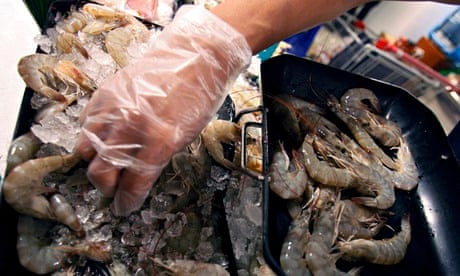Human rights abuses remain widespread within the supply chains of some of the world's largest retailers and brands. Those importing seafood from Thailand must now acknowledge that these abuses include slavery.
The Thai seafood sector employs about 650,000 people, the vast majority of whom are migrant workers from poorer neighbouring countries including Burma, Cambodia and Laos. Many of these workers are trafficked into Thailand and exploited by companies using undocumented, cheap, underpaid workers. The unluckiest, and often the most vulnerable, are sold into slavery to work on Thai fishing boats.
We know this. The Thai government and its agencies know this. The companies doing business with Thailand and selling seafood in Europe, the US and across the world know this.
It is not only international NGOs, such as the Environmental Justice Foundation, campaigning on this issue. For many years, a range of UN agencies, including the International Labour Organisation (pdf), as well as local Thai and Burmese groups, have recognised human trafficking in the Thai seafood sector as a serious problem.
The US state department's Trafficking in Persons (TIP) report, widely considered the gold standard of global slavery reporting, has also repeatedly highlighted the slavery and abuse of trafficked labourers in Thailand. In 2013, the report found that the country had failed to make sufficient progress in tackling human trafficking for the fourth consecutive year.
Beyond the shocking nature of the human rights infringements uncovered, what particularly concerns me about these recent exposés is that many of the companies involved insist they carry out ethical audits of their supply chains under a range of voluntary schemes.
After more than two decades of such schemes, however, extreme abuse within global supply chains remains prevalent. It seems that many of these schemes either always were, or have become, tick-box exercises aimed at fulfilling corporate social responsibility commitments in the boardroom, with little meaningful analysis of their effectiveness on the ground.
Modern supply chains, particularly when sourcing from overseas, can be highly complex. Certainly, there are logistical challenges to address and there will be costs involved. But supply chain complexity and modest financial investment should not excuse companies from failing in their responsibility to ensure their supply chains are free from slavery and environmentally damaging practices.
Companies have the power and the right to demand accountability and require suppliers to provide information on where products come from, how they are produced, and how compliance with labour and environmental standards is monitored. Quite simply, if a company is not able to satisfy itself that human rights abuses don't exist within a particular supply chain, it should not be sourcing those products.
In reality, it's an excuse to argue that seafood supply chains are too complicated to unravel. It is possible to take steps to achieve the levels of transparency, traceability and auditing necessary to eliminate illegal, criminal and outright unethical operators.
Monitoring and oversight of supply chains can be implemented without imposing significantly higher costs on customers or creating unnecessary logistical burdens.
More than anything, it is about developing the systems to implement regular checks on suppliers and adopting a scrupulous approach to inspections and audits. This includes ensuring confidential interviews are carried out with workers, and preventing situations in which companies are able to cover up abuses as soon as they know an inspection is imminent. The focus should be on the sectors and products where the highest risks exist, and this information is readily available. The TIP report offers a good starting point for establishing which products could be linked to slavery and human rights abuses.
The issue essentially boils down to organisational will. If this were a consumer safety issue, you can be sure that the necessary action would be taken quickly and efficiently; I challenge anyone in the retail markets in Europe or the US to deny this fact. After all, giving your customers food poisoning is one of the fastest routes to ruining a brand, losing market share and, ultimately, commercial failure. So do we just accept that we can't do the same to eradicate slavery in our Thai seafood supply? Or do we work together to overcome the obstacles preventing the protection of human rights for those suffering for our food?
It is time for major retailers, brands, importers and suppliers to take determined, decisive action to stop slavery. There are no reasonable arguments left for ad-hoc and largely ineffectual initiatives, for prevarication in the name of dialogue or further study. We are talking about slaves producing food that is on our tables. Business as usual can no longer be an option for any chief executive, nor for shareholders and investors who value their brand, their market share and their profits.







